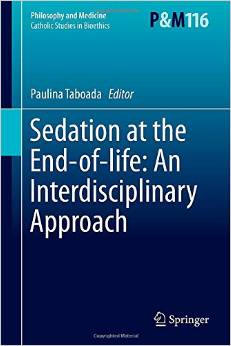Book Review
Sedation at the End-of life:
An interdisciplinary
approach
Paulina Taboada, Editor
Springer 2015
ISBN:
978-9401791052
 This
is a vitally important work, especially at this moment in time,
regarding palliative sedation. Palliative sedation is considered
for pain control but also for "existential suffering". It is
argued that existential suffering may occur for social reasons
rather than because of the illness. For example, there may be
insufficient family support. Deep continuous sedation until
death to treat existential suffering raises serious ethical
concerns. It may be a covert form of euthanasia.
This
is a vitally important work, especially at this moment in time,
regarding palliative sedation. Palliative sedation is considered
for pain control but also for "existential suffering". It is
argued that existential suffering may occur for social reasons
rather than because of the illness. For example, there may be
insufficient family support. Deep continuous sedation until
death to treat existential suffering raises serious ethical
concerns. It may be a covert form of euthanasia.
Boyle argues that the suppression of consciousness cannot be justified by recourse to double effect reasoning while it is possible to do so when it comes to shortening a patient's life by distinguishing between intending and forseeing. In contrast, Miranda argues that the suppression of consciousness can be justified for proportionately serious reasons.
Keown argues that only after we have a proper understanding of the inviolability of life principle can we approach the ethics of palliative sedation. The autonomy principle must be subservient to the inviolability principle. He also argues that quality of life relates to treatment and not to the patient. Otherwise, it can lead to arbitrary discrimination.
This work reminds us that the dying person is among the most vulnerable in society and deserves special protection in law.
REVIEWED BY DR PRAVIN THEVATHASAN
